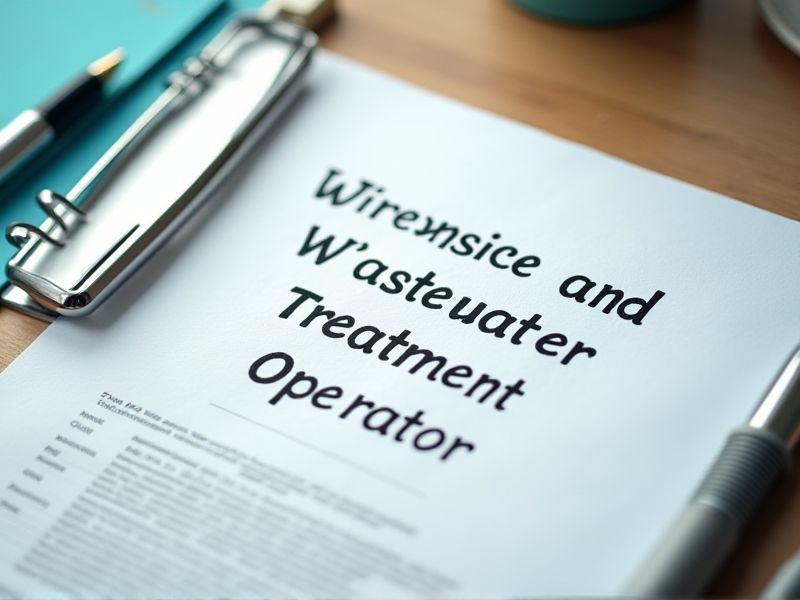
Water and wastewater treatment plant operators are responsible for maintaining essential services that protect public health and the environment. These roles require a solid understanding of chemical processes, engineering principles, and regulatory compliance, making specialized training crucial. Certifications validate an operator's proficiency and ensure adherence to safety and operational standards. Consider exploring these important certifications for a career as a water and wastewater treatment plant operator.
Certified Drinking Water Treatment Plant Operator Certification
Certified Drinking Water Treatment Plant Operator Certification ensures operators possess necessary knowledge and skills, guaranteeing safe and sustainable water management. Certification also establishes standardized protocols, enhancing system efficiency and reducing risks of contamination. Regulatory authorities mandate certification to comply with legal and environmental standards, promoting public health protection. Proper certification often leads to improved confidence from communities served by the operators.
Certified Wastewater Treatment Plant Operator Certification
Obtaining the Certified Wastewater Treatment Plant Operator Certification ensures operators have the necessary knowledge to maintain water quality standards, directly impacting public health. This certification provides a standardized skill set that improves the efficiency and effectiveness of wastewater treatment processes. Regulatory compliance is a critical concern, and certified operators are better equipped to meet government regulations, reducing the risk of penalties. Certified operators also bring a level of trust and credibility, reassuring the public and stakeholders of the plant's environmental responsibility.
Operator-in-Training Certification (OIT)
Operator-in-Training Certification (OIT) is crucial because it ensures that individuals have the foundational knowledge and skills necessary for overseeing water and wastewater treatment processes safely and effectively. Certification helps standardize operational procedures, reducing risks of contamination and environmental harm. The certification provides a structured learning path that aligns with industry regulations, maintaining compliance with safety and quality standards. Employers benefit from certified operators as they demonstrate a commitment to professional development and operational excellence.
Advanced Wastewater Treatment Operator Certification
Advanced Wastewater Treatment Operator Certification ensures operators have the necessary skills and knowledge to effectively manage and treat complex wastewater systems. As wastewater regulations become more stringent, certified operators are better equipped to ensure compliance, protecting public health and the environment. Certification also enhances career prospects by demonstrating a higher level of expertise and commitment to professional development. Well-trained operators contribute to the efficient functioning of treatment facilities, leading to cost savings and improved system performance.
Process Control Technician Certification
Process Control Technician Certification equips operators with necessary skills to manage complex automated systems in water and wastewater treatment plants, ensuring operational efficiency. The certification educates technicians on regulatory compliance, mitigating risks of legal penalties. Training included in the certification emphasizes safety protocols, reducing workplace accidents and equipment failures. It enhances understanding of treatment processes, leading to improved water quality and public health outcomes.
HAZWOPER Certification
HAZWOPER Certification is needed for Water and Wastewater Treatment Plant Operators to ensure safe handling and disposal of hazardous substances, minimizing health risks. This certification equips operators with the skills to manage emergency situations involving hazardous waste spills or exposure. Regulations, such as OSHA standards, mandate this certification to maintain compliance and safety standards within the industry. Proper training reduces the likelihood of accidents and environmental contamination, safeguarding public health.
Confined Space Entry Certification
Confined Space Entry Certification is essential for water and wastewater treatment plant operators because such environments often present hazardous atmospheres that can harm worker health. The certification ensures operators are trained to recognize and mitigate risks like toxic gas accumulation or oxygen deficiency, thereby reducing potential injuries. It also equips them with the knowledge to use specialized safety equipment correctly, ensuring compliance with occupational safety regulations. Employers can minimize liability and maintain operational safety standards effectively through certified training.
OSHA 30-Hour General Industry Certification
The OSHA 30-Hour General Industry Certification equips Water and Wastewater Treatment Plant Operators with comprehensive knowledge on workplace safety standards, reducing the likelihood of accidents and injuries. This certification ensures operators are well-versed in regulatory compliance, which is critical in environments dealing with hazardous chemicals and processes. Enhanced safety awareness through this certification can lead to improved operational efficiency, as fewer safety incidents result in less downtime. Certified operators signal to employers and regulatory bodies a commitment to maintaining a safe working environment, which can be a valuable asset in audits and inspections.
SCADA Systems Operation Certification
SCADA Systems Operation Certification ensures operators have the necessary skills to efficiently manage and monitor automated processes within water and wastewater treatment facilities. Proficiency in SCADA systems enhances response times to system anomalies, reducing the risk of environmental contamination. Certification establishes a standardized understanding of system operations, which promotes consistent safety and performance standards across facilities. The certification can lead to improved operational efficiencies and cost savings in plant operations due to better resource management and reduced downtime.
Environmental Management Systems (EMS) Certification
EMS Certification is crucial for water and wastewater treatment plant operators as it ensures compliance with environmental regulations, minimizing the risk of legal penalties. It enhances operational efficiency by systematically identifying environmental impacts and implementing effective management practices. Certification fosters a culture of continuous improvement, leading to reduced resource consumption and waste generation. It demonstrates a commitment to sustainability, improving community trust and stakeholder relations.
Summary
As a Water and Wastewater Treatment Plant Operator, obtaining certifications can significantly enhance your expertise and proficiency. This recognition often leads to increased job opportunities and potential for salary growth. The acquired skills and knowledge can improve plant efficiency and ensure compliance with regulatory standards. With these qualifications, you can also play a crucial role in environmental conservation and public health safety.
